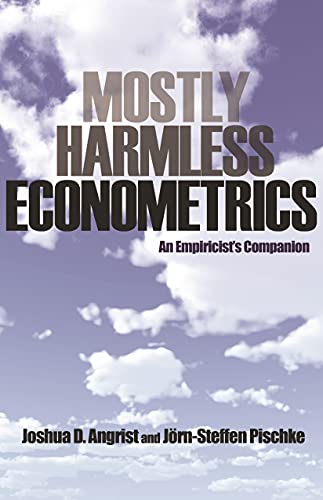Articoli correlati a Mostly Harmless Econometrics: An Empirict's Companion:...

Sinossi
The core methods in today's econometric toolkit are linear regression for statistical control, instrumental variables methods for the analysis of natural experiments, and differences-in-differences methods that exploit policy changes. In the modern experimentalist paradigm, these techniques address clear causal questions such as: Do smaller classes increase learning? Should wife batterers be arrested? How much does education raise wages?Mostly Harmless Econometrics shows how the basic tools of applied econometrics allow the data to speak.
In addition to econometric essentials, Mostly Harmless Econometrics covers important new extensions--regression-discontinuity designs and quantile regression--as well as how to get standard errors right. Joshua Angrist and Jörn-Steffen Pischke explain why fancier econometric techniques are typically unnecessary and even dangerous. The applied econometric methods emphasized in this book are easy to use and relevant for many areas of contemporary social science.
- An irreverent review of econometric essentials
- A focus on tools that applied researchers use most
- Chapters on regression-discontinuity designs, quantile regression, and standard errors
- Many empirical examples
- A clear and concise resource with wide applications
Le informazioni nella sezione "Riassunto" possono far riferimento a edizioni diverse di questo titolo.
Informazioni sull?autore
Joshua D. Angrist is professor of economics at the Massachusetts Institute of Technology. Jorn-Steffen Pischke is professor of economics at the London School of Economics and Political Science.
Dalla quarta di copertina
"This pathbreaking book is a must-read for any scientist who is interested in formulating and testing hypotheses about the social world. This includes political scientists, sociologists, historians, geographers, and anthropologists. The book is clever and funny, and guides you through the tangle of problems that confront empirical research in social science. I wish I had had it years ago."--James Robinson, Harvard University
"What a fascinating and useful book! The application of econometrics in empirical research is as much art as science. What is most distinctive aboutMostly Harmless Econometrics relative to other graduate-level econometrics books (besides the colorful prose style!) is that because the authors are longtime practitioners of applied microeconometrics, they speak often and insightfully about the art. I expect it's a great thing to work in the same department with Angrist or Pischke and to be able to ask their advice. Having this book close at hand is the next best thing. When you consult the book to see 'What would Angrist and Pischke do?' about econometric issues you encounter in your own research, you won't necessarily end up doing what they would in every single instance, but I bet you always will benefit from getting their take on the issue."--Gary Solon, Michigan State University
"Interesting and unusual, this is an econometrics book with attitude. It offers real answers and suggestions to problems faced daily by those engaged in the analysis of economic data. I will recommend it to my students."--Guido Imbens, Harvard University
"A well-written and very quirky take on econometric practice."--Orley Ashenfelter, Princeton University
Dal risvolto di copertina interno
"This pathbreaking book is a must-read for any scientist who is interested in formulating and testing hypotheses about the social world. This includes political scientists, sociologists, historians, geographers, and anthropologists. The book is clever and funny, and guides you through the tangle of problems that confront empirical research in social science. I wish I had had it years ago."--James Robinson, Harvard University
"What a fascinating and useful book! The application of econometrics in empirical research is as much art as science. What is most distinctive about Mostly Harmless Econometrics relative to other graduate-level econometrics books (besides the colorful prose style!) is that because the authors are longtime practitioners of applied microeconometrics, they speak often and insightfully about the art. I expect it's a great thing to work in the same department with Angrist or Pischke and to be able to ask their advice. Having this book close at hand is the next best thing. When you consult the book to see 'What would Angrist and Pischke do?' about econometric issues you encounter in your own research, you won't necessarily end up doing what they would in every single instance, but I bet you always will benefit from getting their take on the issue."--Gary Solon, Michigan State University
"Interesting and unusual, this is an econometrics book with attitude. It offers real answers and suggestions to problems faced daily by those engaged in the analysis of economic data. I will recommend it to my students."--Guido Imbens, Harvard University
"A well-written and very quirky take on econometric practice."--Orley Ashenfelter, Princeton University
Le informazioni nella sezione "Su questo libro" possono far riferimento a edizioni diverse di questo titolo.
(nessuna copia disponibile)
Cerca: Inserisci un desiderataNon riesci a trovare il libro che stai cercando? Continueremo a cercarlo per te. Se uno dei nostri librai lo aggiunge ad AbeBooks, ti invieremo una notifica!
Inserisci un desiderata
